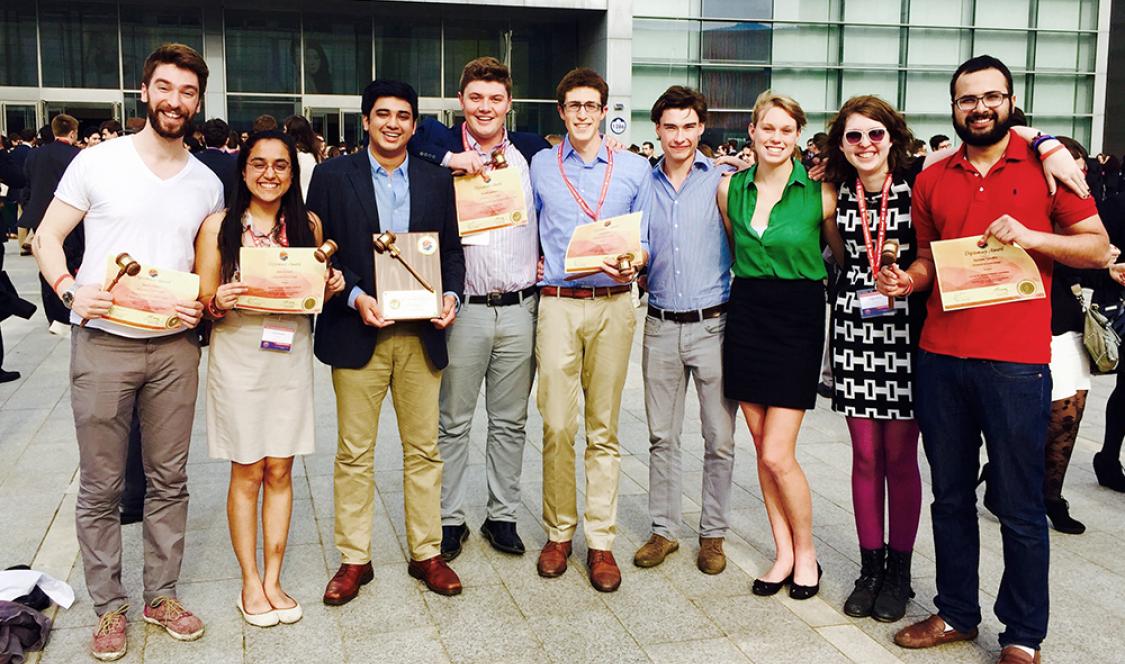UPDATE 3/25:
CMC MUN TEAM WINS INTERNATIONAL COMPETITION!
Claremont McKenna's Model UN team recently competed in the the Harvard World Model United Nations (WorldMUN) conference, winning the conference in their size division.
According to team president Aseem Chipalkatti '15, the WorldMUN, which took place March 16-20 in Seoul, South Korea, is billed as the "Olympics of MUN" and is very much the top-billed conference in the world.
"This is a huge accomplishment," says Chipalkatti. "It involved beating out not only the country's top teams (many of whom compete at the conference), but also the world's top teams. In essence, we can effectively claim that CMC has a world champion Model UN team - which is nothing short of a little exciting for us! This is the second time in four years that we're World Champions."
Chipalkatti, who wanted to thank the College and ASCMC for its support of the Model UN team, had this to say about the team's steep rise on the world stage: "We started from just about nothing four years ago - we were a non-ranked team that barely competed in conferences. By contrast, we are now an internationally renowned team that has global name recognition. "
The members of the team, in alphabetical order:
Aviv Caspi '16
Aseem Chipalkatti '15 Nina Kamath '16
David Leathers '15 Griffin Merians '17
Ellen Perfect '17
Sumaer Sandhu '16
Pippa Straus '17
Dante Toppo '15
EARLIER STORY (2/26):
Winner Takes All: CMC is Victor in Harvard National Model United Nations Team Competition
For the first time ever, CMC’s Model United Nations (MUN) Team took home top honors during Harvard’s National Model United Nations conference held Feb. 12-15 in Boston. In aggregate competition, CMC competed against college and university student teams from more than 60 countries. In the annual competition, MUN teams send individual members to compete as part of specialized committees, generally representing a single country.
According to Aseem Chipalkatti ’15, President of CMC’s MUN and a competing team member since his freshman year, CMC represented Sierra Leone, and discussed matters ranging from Millennium Development Goals to global Journalistic Freedom and Protections.
“Additionally, two members (me and Dante Toppo ‘15) competed in ‘crisis’ committees where we reenacted the National Presidium of Benin in 1990 and a special summit of the cabinet of Bosnia and Herzegovina as members of those specific bodies.”
Competing teams are evaluated on their ability to lead discussion, provide valuable insight, and create compromise, with individual delegates evaluated on their ability to produce a workable solution to a presented question while protecting their own country's interest in a diplomatic and collaborative manner.
“This is difficult, and a problem that world leaders struggle with as well, which makes us especially proud of all of the members of our team,” Chipalkatti said.
Besides Chipalkatti who is a Philosophy, Politics, and Economics-Middle East Studies dual major, and Toppo, other members of CMC’s MUN team include; Phillip Pennell '16, Christina Straehle '16, Sam Minter '17, Pippa Straus '17, Griffin Merians ' 17, Naina Mullick '17 and Rose Agri '17.
Chipalkatti partially attributes the MUN team’s success in competition to something ineffable that he calls a “CMC style” that is friendly and collaborative.
“Our team's style is much the same as the school's in general; we make sure to back up a strong competitive attitude with an equally strong sense of friendliness and good-natured social interaction,” he said. “As much as this may be ‘nerd Olympics,’ we like to have fun with it.”
Another big advantage for the CMC MUN team is the fact that the college produces a very strong selection of interdisciplinary-minded students.
“We are not a team of solely International Relations majors (though many of us are),” Chipalkatti said. “Instead, we draw from all of the school's various departments – PPE, IR, Government, Literature, Philosophy, the Keck Science Department – and trust that our education and academic experiences at CMC give us the liberal arts foundation necessary to succeed in Model UN.”
But, according to Chipalkatti, perhaps the largest contribution comes from former team members who have already graduated. “We're an exceptionally young team on the circuit – most other schools that have programs of our caliber have been around for decades,” he said. “We've been competing for around four years in our current incarnation. The CMC alumni who have built this team from the ground-up provided the necessary solid foundation for our success.”
Although, admittedly it is rare to see a MUN delegate actually go on to work for the United Nations, the skills acquired in competition can judiciously apply to just about any work environment. Collaboration, friendliness, and initiative are valued in any workplace, and the MUN provides a space for CMC students to learn and practice those skills.
“On a more individual level, Model UN has provided me other students on the team with other benefits,” Chipalkatti said. “We spend a lot of time with each other on the road and at CMC, and Model UN will continue to function as a social unit even after we all graduate. Even though some of our new members have never met our first sets of alumni, they still continue to interact online and in other venues. Model UN is very much a family that exists beyond the scope of a committee room or practice session. And win or lose, that remains the most valuable thing about Model UN at CMC.”

